| Areas | |
|---|---|
| Serie de libros (96) |
1381
|
| Nachhaltigkeit |
3
|
| Gesundheitswesen |
1
|
| Letra |
2370
|
| Ciencias Naturales |
5408
|
| Matemática | 229 |
| Informática | 319 |
| Física | 980 |
| Química | 1364 |
| Geociencias | 131 |
| Medicina humana | 243 |
| Estomatología | 10 |
| Veterinaria | 108 |
| Farmacia | 147 |
| Biología | 835 |
| Bioquímica, biología molecular, tecnología genética | 121 |
| Biofísica | 25 |
| Nutrición | 45 |
| Agricultura | 1005 |
| Silvicultura | 201 |
| Horticultura | 20 |
| Ecología y conservación de la tierra | 148 |
| Ciencias Ingeniería |
1795
|
| General |
98
|
|
Leitlinien Unfallchirurgie
5. Auflage bestellen |
|
Erweiterte Suche
On the Complexity of Modal Logic Variants and their Fragments (Tienda española)
Arne Meier (Autor)Previo
Indice, Datei (44 KB)
Lectura de prueba, Datei (100 KB)
The automatic verification of computer programs is an important step in software engineering. In this regard temporal logics have been invented as an extension of modal logic which itself is an extension of propositional logic. Therefore, one may call them \emph{modal logic variants}.
The first part of this thesis will investigate the two temporal logics CTL and CTL* with respect to their model-checking and satisfiability problem. We will analyze the complexity of fragments of these problems by means of operator and Boolean function restrictions. There we will see for the satisfiability problem, how the operator fragments form a trichotomy and the Boolean fragments form a quartering. The model-checking problem for CTL is divided into three types: monotone, atomic negation, and positive fragments. Surprisingly, we will see that these three fragments are computationally equivalent. Furthermore, several prominent extensions of CTL will be visited and classified with respect to their Boolean and operator fragments.
In the second part we will concentrate on description logics which are modal logic extensions settled in the area of semantic web, databases, and artificial intelligence. These types of logics are used to express, and work on, large sets of data. Besides the usual satisfiability problems, we will work with some special kind of implication problem, which is called subsumption. We will see that these logics combine two very strong Boolean concepts, namely implication and conjunction, such that restricting large sets of Boolean functions do not reduce the complexity of the problems significantly.
| ISBN-10 (Impresion) | 3869559292 |
| ISBN-13 (Impresion) | 9783869559292 |
| ISBN-13 (E-Book) | 9783736939295 |
| Formato | A5 |
| Idioma | Inglés |
| Numero de paginas | 148 |
| Laminacion de la cubierta | mate |
| Edicion | 1 Aufl. |
| Volumen | 0 |
| Lugar de publicacion | Göttingen |
| Lugar de la disertacion | Hannover |
| Fecha de publicacion | 15.11.2011 |
| Clasificacion simple | Tesis doctoral |
| Area |
Informática
|
| Palabras claves | Beschreibungslogik, Komplexität, Modale Logik, Post'scher Verband, Temporale Logik. |








